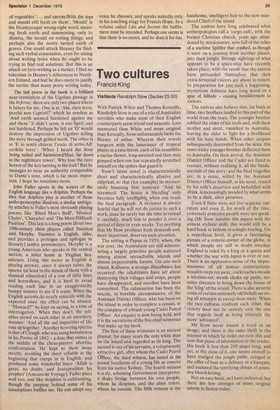Two cultures
Francis Xing
Visitants Randolph Stow (Sacker £5.50) With Patrick White and Thomas Keneally, Randolph Stow is one of a trio of Australian novelists who make most of their English counterparts seem trivial and anaemic. Less mannered than White and more original than Keneally, Stow unfortunately lacks the fluency of either. Whereas their novels burgeon with the luxuriance of tropical plants in a rain-forest, each of his resembles a cactus-flower, long-awaited and then only grasped when one has repeatedly scratched oneself on the spikes that guard it.
Stow's latest novel is characteristically short and characteristically allusive and elliptical, so that (for example) its mysteriously haunting first sentence 'And he screamed: The house is bleeding' only becomes fully intelligible when one reads the final paragraph. A reviewer is always fearful that he will not do justice to such a work, since he rarely has the time to reread it carefully, much less to ponder it over a period of days or even weeks. Yet anything that Mr Stow produces both demands and, more important, deserves such attention.
The setting is Papua in 1959, when, the war over, the Australians are still administering a largely primitive people scattered among almost unreachable islands and almost impenetrable forests. On one such Kailuana, a strange disturbance has occurred: the inhabitants have set about destroying their villages and crops, people have disappeared, and murders have been committed. The culmination has been the suicide, in horrible circumstances, of the Assistant District Officer, who has been on the island in order to complete a census, in the company of a brash young Cadet Patrol Officer. An enquiry is now being held, and it is the narrations of the five chief witnesses that make up the book. The first of these witnesses is an ancient planter, for many years the only white man on the island and regarded as its king. The second is one of his servants, a voluptuously attractive girl, after whom the Cadet Patrol Officer, the third witness, has lusted in the sexual loneliness of a young life so remote from his native Sydney. The fourth witness is a sly, scheming Government interpreter, a shaky bridge between his own people, whom he despises, and the alien rulers, whom he resents. The fifth witness is the handsome, intelligent heir to the now murdered Chief of the island.
The natives have long celebrated what anthropologists call a 'cargo cult', with the former Christian church, years ago abandoned by missionaries, now full of the relics of a wartime Spitfire that crashed, as though it were on a journey from another planet, into their jungle. Strange sightings of what appears to be a space-ship have recently taken place; with the result that the natives have persuaded themselves that their extra-terrestial visitors are about to return. In preparation for just such a happening, mysterious dolmens have long stood on a spur of hillside — causing bewilderment to visitors.
The natives also believe that, far back in time, two brothers landed in this part of the world from the stars. The younger brother robbed the older of his tools and, with their mother and sister, vanished to Australia, leaving the older to fight for a livelihood with his bare hands. When other cargoes subsequently descended from the skies, this same tricky younger brother deflected them to Australia. On their arrival, the Assistant District Officer and the Cadet are fated to reenact, without realising it, all the fundamentals of this story; and the final tragedies are, in a sense, willed by the Assistant District Officer himself, as his mind, crazed by his wife's desertion and befuddled with drink, is increasingly invaded by what seems to be a dark, alien presence.
Even if there were not five separate narrators and even if, for much of the time, extremely primitive people were not speaking (Mr Stow handles this aspect with the utmost stylistic skill) this would still be a hard book to fathom at a single reading. On a superficial level, it gives a fascinating picture of a remote corner of the globe, in which people are still in doubt Whether England is ruled by a king or a queen and whether the war with Japan is over or not. There is an oppressive sense of the impermanence of all human constructions: wooden steps rot away, cockroaches invade a wireless-set, weeds choke up paths, termites threaten to bring down the house of the 'king' of the island. There is also an eerie sense of certain extremely old beliefs surviving all attempts to sweep them away. When the two cultures confront each other, the victory does not lie entirely with the one that regards itself as being infinitely the more 'advanced'.
Mr Stow never wastes a word or an image; and there is the same thrift in the manner in which he doles out now this and now that piece of information to the reader. His book is less than 200 pages long; and yet, at the close of it, one seems oneself to have trudged the jungle paths, cringed at the offer of bats as a delicacy at a banquet, and endured the terrifying climax of primitive blood-letting.
Not an easy book, as I have indicated; but there are few stronger or more original talents in fiction today.











































 Previous page
Previous page